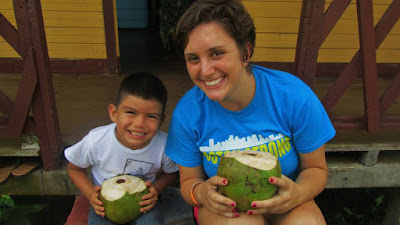Meet the staff: Prof. Helen Temple
This time we want to introduce Prof. Helen Temple, who also makes of ICDS' courses a unique opportunity for students to enrich their education.
1) What have you been working on lately? What do you
teach? What is the value - added of your teaching (or course) for international
students?
I have recently joined a multidisciplinary
research team trying to push forth protection for Costa Rican sharks. We are
creating a new platform to stimulate the discussion of environmental conflicts
and appropriate policy. I am also a forest guardian and spend time developing a
forest reserve project which is applying for environmental payment services.
I have also made a personal SDGs commitment for
2016 to organize a series of conferences to discuss sustainability issues and
provide a new platform at a Costa Rican private university for professionals
and interested parties. I am presently organizing the second one.
I teach various courses related to sustainable
development and environmental sociology. These include Sustainable Tourism and
Local Development, Rural and Urban Sustainable Development, Gender and
Sustainable Development, Human Rights in Latin America, Costa Rican
Environmental Policy and Action.
The added value of my courses:
- I bring over twenty years of knowledge of the Latin American development and environmental context into the classroom. I have been studying, researching and teaching in Central America for 20 years.
- I am able to guide the students through an exploration of the Costa Rican context, encouraging them to experiment in first hand research opportunities.
- I am constantly engaged in study abroad elective course development and teacher training workshop preparation.
- I bring a bilateral perspective to the classroom.
- I have multidisciplinary and multi-sectoral experience, working with a variety of academic teams and sectors in the field of sustainable development and conservation.
2) How does study abroad contributes to responsible
global citizenship?
Study
abroad contributes to responsible global citizenship in so many ways. For
example, students are able to leave their comfort zones and share and discover
new and often exciting things about themselves and others. This can help
diminish their shyness and apprehension toward new experiences and toward
people from different cultures and backgrounds. They get to appreciate
different lifestyles and attitudes at close range and emerged in other’s
realities. They are also able to develop intercultural perspectives and skills.
They can use the opportunity to learn or improve a second or third language,
which helps to further develop emersion and understanding of cultures, ideas
and views.
Student’s
who study abroad carry valuable inter-cultural experiences with them through
life; study abroad can offer a catalyst for personal growth and reflection,
develop flexibility, openness, compassion, empathy, mindfulness and a critical
attitude. These traits often help to develop students desire to be active
citizens who participate in decision making processes, are engaged in their
communities, and appreciate the issues that impact on their needs and those
around them.
3) For that purpose, what is the contribution of ICDS?
I have personally witnessed
the students that study with us at ICDS go through this (above described)
personal development process; they grow with us.
4) Why are ICDS programs an excellent complement to
the home college education?
ICDS programs offer a unique experience and
excellent complement because: students are emerged in Costa Rican culture and
surrounded by highly qualified and competent professionals who have an interest
to guide them through an exploration of development and sustainability issues.
Both teachers and Costa Rican community members help broaden student’s
understanding of the salient global and local development issues of our time,
and help nurture and support more capable and confident young people who have
an interest in the world around them, and who want to contribute to healthy and
safe communities in their home countries and beyond.



Comments
Post a Comment